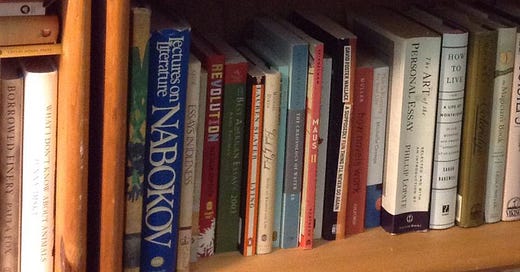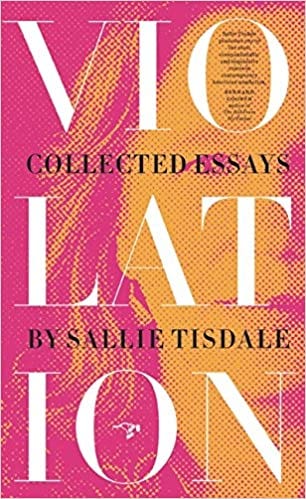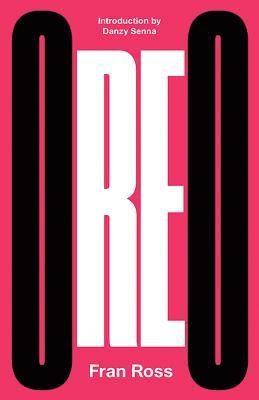A college class made me fall in love with essays. It’s personal essays I love, or maybe more exactly it’s personal essays that gesture toward something larger, something out in the world, while still being about someone’s life or thoughts. Great essays will let you into someone’s brain, or give the impression of letting you into someone’s brain, while they are thinking about something that matters, or that they make matter by the way they write about it. Great essayists can make any subject fascinating. I mentioned Sallie Tisdale’s collection Violation last week: I’ll never forget her wonderful essay on flies:
“My eyes are glued to flies and it is as though they are stitched open against my will. I feel revulsion, I flinch, I turn away, I duck for cover. I get squeamish, which is a rare feeling for me. But I also feel curiosity and admiration and a kind of awe. The buzz of a fly’s blurred wings is one of the myriad ways the world speaks to us; it is one of the ways speech is freed from our ideas. I feel that if I could listen, if I could just listen without reacting, without judgment or preference or opinion — without reaching for a dream of how things might be otherwise — there is something I would understand that I have yet to know.”
This essay tells us about Tisdale but it also tells us about ourselves:
“Humans are a nightmare; we tear the earth apart. We trepan mountains and pour them into rivers, take the soil apart down to its atoms, sully the sea, shred our world like giants rutting after truffles. We poison our nest and each other and ourselves. We eat everything, simply everything, but we turn away from flies.”
This essay is called “The Sutra of Maggots and Blowflies,” and it’s about Buddhism and human nature as much as it is about flies. The best essayists — Tisdale is among them and needs more recognition — can work magic with their subjects, whatever they are.
Essays are a way of seeing someone think on the page. The best ones, for me, preserve the thinking process: they don’t just show the results of thinking, they show the way the essayists got to their results. Or maybe there are no results at all and it’s all process, movement through ideas that goes nowhere or ends in more questions. I love those essays too.
What I want most in an essay is a sense of personality. I want an enjoyable companion while I’m reading — not necessarily someone I want to meet in real life (because some essayists intimidate me!) — but someone who is fun to spend time with. All I want in an essayist is that they be brilliant and interesting and capture those qualities in lively, entertaining sentences that cohere into some kind of satisfying form. That’s not too much to ask, right? (That’s what I want in fiction too, honestly, and it’s why I like fiction that reads like a personal essay.)
I read 18 essay collections in 2020. I feel like that’s a lot, even for me! Below is a list of my favorites from those published last year (with the exception of one that comes out this March). I didn’t include Zadie Smith’s book Intimations because it was on my best-of list, but obviously, I think that book is great. Of the books below, seven come from small presses:
This is One Way to Dance by Sejal Shah (University of George Press): Essays about place and identity, about being a writer, a writer of color, a South Asian American, and more. Shah is from Rochester, my home town, and writes a lot about the city, which was a particular pleasure.
A Fish Growing Lungs by Alysia Li Ying Sawchyn (Burrow Press): A linked essay collection about Sawchyn’s diagnosis of Bipolar I at age 18 and her later realization that this diagnosis was a mistake (among many other things).
Pass With Care by Cooper Lee Bombardier (Dottir Press): Essays about Bombardier’s experiences as a trans man — about what masculinity means to him and how he moved toward his transition.
Terrior by Natasha Sajé (Trinity University Press): Essays that explore the places Sajé lived and how they shaped her. A wide-ranging collection of pieces about identity, travel, and place.
How to Make a Slave by Jerald Walker (Mad Creek Books): Essays on being a Black man in America, and also about parenting, family, writing, and more.
The Age of Skin by Dubravka Ugresic, translated by Ellen Elias-Bursac (Open Letter): Ugresic grew up in the former Yugoslavia (and currently lives in Amsterdam) and writes about the contemporary state of Europe, including the Balkan countries and the return of fascism in Europe.
Minor Feelings by Cathy Park Hong (One World): I really loved this one. Cathy Park Hong writes about art, writing, and race, among other things. These are personal essays with sharp cultural insights.
Unfinished Business by Vivian Gornick (Farrar, Straus and Giroux): Gornick writes about rereading authors such as D.H. Lawrence, Marguerite Duras, Elizabeth Bowen and how she and her feelings about the books have changed.
The Unreality of Memory by Elisa Gabbert (FSG Originals): Essays about disaster but even more so about the way we make sense of disaster (or don’t).
White Space by Jennifer De Leon (University of Massachusetts Press): This one comes out in March 2021. These are essays about De Leon’s experiences as the child of immigrants and about her experiences becoming a writer.
My Writing Elsewhere
I published a list of the 24 books in translation I’m most excited about over at Book Riot. These are books I haven’t yet read but that have caught my eye and that people have highly recommended to me. More for your TBR!
A short review of Elvira Navarro’s Rabbit Island (translated by Christina MacSweeney) is up at Foreword Reviews — with a star!
Don’t Forget About
Oreo by Fran Ross (New Directions 2015, originally published in 1974): This book is wild! Oreo is a child of a Black mother and a Jewish father. The novel is about her quest to find her father — told in a way that parodies the story of Theseus. It begins in Philadelphia and moves to New York City where Oreo’s adventures really take off. What’s most memorable to me is Ross’s linguistic exuberance: this is a book for people who love playfulness, bravado, and wicked humor. The book even has drawings and charts. It’s a very smart look at race, language, and culture.
Publishing This Week
New books I haven’t yet read that are going on my TBR:
Pedro’s Theory: Reimagining the Promised Land by Marcos Gonzalez (Melville House): A memoir of sorts. Marcos Gonzalez explores the lives of many “Pedros,” some of whom are based on his life, some are not, all of whom are hoping and struggling to find the American Dream
The Dangers of Smoking in Bed by Mariana Enriquez, translated by Megan McDowell (Hogarth Press): Twisty, nightmarish, unsettling short stories set in Argentina. This is Enriquez’s follow-up to her collection Things We Lost in the Fire.
Newly Acquired
The Lost Writings of Franz Kafka, by Franz Kafka, translated by Michael Hofmann (New Directions, 2020): The latest book in my New Directions subscription. A collection of pieces that have been out of print for decades and a couple that had never been translated.
Rein Gold by Elfriede Jelinek, translated by Gitta Honegger (Fitzcarraldo Editions, publishing May 18, 2021): The publisher Fitzcarraldo publishes wonderful fiction and nonfiction in translation — they are reliably good. This one uses Wagner’s Ring cycle as a take-off point, extending its story into the present day.
Aquarium by Yaara Shehori, translated by Todd Hasak-Lowy (Farrar, Straus and Giroux, publishing April 13, 2021): a review copy sent to me by the publisher. Yaara Shehori is an Israeli novelist and poet. This is a novel about two sisters raised in seclusion and what happens when their isolation ends.
Begin by Telling by Meg Remy (Book*hug Press, publishing March 16, 2021): A review copy from the publisher. Illustrated lyric essays about the author’s memories of historical events. Remy is an artist, songwriter, and performer, as well as writer.
Currently Reading
The Wind That Lays Waste by Selva Almada, translated by Chris Andrews (Graywolf, 2019): I actually just finished this very short novel about four people spending the day together in rural Argentina after a car breaks down. A preacher father and his daughter are stopped on their journey in a very remote place, and an older man and teenage boy work on their car while they all talk about God. I liked it very much! I’m still thinking through what it all means.
How to Write an Autobiographical Novel by Alexander Chee (Mariner Books, 2018): A collection of personal essays. I’ve read only the first two so far (I read essay collections slowly, usually, one essay at a time). So far Chee has written about a transformative trip to Mexico and his history with Tarot-reading. So far so good.
The Tradition by Jericho Brown (Copper Canyon Press, 2019): continued from last week (I read poetry collections very slowly).
Big Girl, Small Town by Michelle Gallen (Algonquin Press, 2020): continued from last week. I also listen to audiobooks very slowly, maybe on average 20-30 minutes a day, so a long audiobook can take several weeks.
The Cormac Report
Once again, many thanks to Dorian Stuber for his book recommendations! This time his recommendation was for Cormac: Hatchet by Gary Paulsen. We just finished it this weekend. At this point, Cormac is capable of reading a book like this on his own, but he doesn’t have the confidence and/or patience to actually do it, so I read it to him (and I don’t want to stop reading to him until he makes me). He loved it. He found it frightening at points — as did I, to be honest — which is another reason it’s good to read together. I can see why this book has been so popular: the details of how Brian figures out how to survive are fun to follow, and, of course, Robinson Crusoe-like tales are endlessly fascinating.
We have trained our child well, because the first thing he said upon finishing is, “Can we get more Gary Paulsen books?”
Have a great week everyone!






I think what I loved most about Oreo is that she wandered around the city having adventures but she was never in danger or facing a sexual threat. It was so liberating to read. More Paulsen is a great idea but I would also recommend Jean Craighead George’s classic My Side of the Mountain for a Hatchet lover.
I read Oreo a few years ago and wild is right! It was smart and funny and thought provoking. I'm in the holds queue at the library for Jericho Brown's collection. I hate waiting, but I also love that there is a holds queue at the public library for a poetry collection!